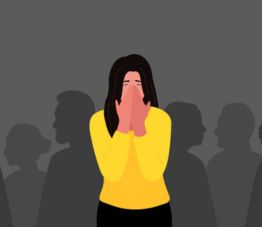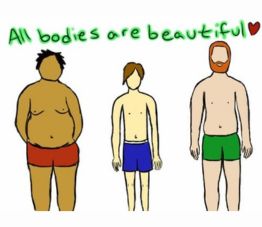It’s common to experience anxiety in certain social settings. For instance, giving a presentation or going on a date can make you feel a little nervous, which is expected. A mental health issue known as social anxiety disorder is defined by a dread of being observed or evaluated by others in social settings. When you have social anxiety disorder, also known as social phobia, you constantly worry about how other people will react to you in social situations and feel self-conscious and embarrassed.
Not everyone enjoys public speaking or entering a room full of strangers, but most individuals can manage it. The tension of these circumstances is too much for someone with social anxiety disorder to endure. Because you feel so uncomfortable doing things that other people would consider “normal,” such as making small conversation and eye contact.
The fear, worry, and avoidance that characterise social anxiety disorder are different from normal anxiety because they affect relationships, daily activities, work, school, and other activities. The onset of social anxiety disorder often occurs between the ages of early and mid-teens, however it can also happen in younger children or adults.
Everyone with social anxiety avoids particular situations for a variety of reasons. But generally, it’s a profound worry of:
- Being scrutinised or observed by others when in a social setting
- Blushing, perspiring or shivering as a result of being ashamed or degraded
- Unintentionally offending someone
- Having the spotlight on you
- Meeting new people
- Performing in front of other people
- Eating or drinking while being watched
Especially among children, feeling timid or uneasy in specific situations is not always a marker of social anxiety disorder. Various personality attributes and life experiences affect social comfort levels. Some people are extroverted by nature, while others are more reserved. To get a better look at what indicates a social anxiety condition, let’s look through a few common symptoms which are found in most people.
Emotional Symptoms
- Fear of encounters where you could receive unfavourable judgement
- Fear of a dreaded activity or event-related anxiety
- Severe anxiety or fear in social situations
- Worry about making yourself look bad or humiliated.
- Severe anxiety while engaging or conversing with strangers
- Avoidance of situations or interactions with individuals out of discomfort or shame
- Avoiding circumstances where you’d be the focus of attention
- Fear that people may notice that you appear worried
- Fear of experiencing physical side effects that could humiliate you, such as blushing, perspiring, trembling, or having a trembling voice
Physical symptoms
- Blushed face
- Rapid heart rate
- Shivering
- Perspiring
- Nausea or a stomach-ache
- Having trouble breathing
- Unsteadiness or faintness
- Feeling as though your mind is blank
- Tense muscles
These symptoms can significantly interfere with daily activities like jobs, relationships, and school. Without proper treatment, the person might not perform to their full potential at school or job because they might avoid speaking in front of groups, taking part in group projects, or getting promoted.
Social anxiety can exacerbate other problems like depression or substance use disorders when it is severe or persistent.
What causes social anxiety?
The notion that it is brought on by a fusion of genetics and environmental variables is supported by current research. This issue may also be influenced by stressful experiences, such as bullying, interpersonal conflicts, and mental and sexual abuse.
Anxiety disorders can run in families. They may or may not be related to hereditary factors, according to researchers. For instance, if a child observes their anxious parent acting out, they may grow up with an anxiety problem themselves. Being reared in a rigid or overly protective atmosphere can also cause children to develop anxiety disorders.
Serotonin imbalances and other medical complications may also be a factor in this illness. A brain chemical called serotonin aids with mood regulation. These conditions may also be brought on by an overactive amygdala, a brain region that regulates the fear response and anxiety-related emotions and thoughts.
Treatment Options –
- Therapy (CBT) – The most effective professional treatment for social anxiety disorder has been demonstrated to be cognitive-behavioural therapy (CBT). The foundation of cognitive behavioural therapy (CBT) is the idea that thoughts influence feelings and feelings influence behaviour. Your therapist works with you to alter your unhelpful or harmful thought and behaviour patterns. CBT often involves several sessions. Your therapist will assist you in gaining a new perspective by listening to you talk and by encouraging questioning. As a result, you gain the ability to handle stress, anxiety, and challenging circumstances better.
- Medication – Antidepressants are the first-line treatment for social anxiety disorders and are useful for treating depression and anxiety disorders. Usually, anti-anxiety drugs are taken for a shorter amount of time. Beta-blockers, which are blood pressure medications, can also be used for symptoms of social anxiety disorder.
Tips to manage anxiety-
- Reframing your thoughts – A person’s current fear about speaking to others or being in public will be reinforced if they cling to the belief that they are shy. Thoughts influence how we behave. People are led through the reframing process as part of a CBT method. Putting these ideas down on paper can be beneficial. “I am a shy person,” for instance, can be changed to “I behaved in a timid manner during the gathering.” Knowing that they can alter how they view themselves and how they believe others see them may be helpful to the individual.
- Switch your focus – Many of us have a tendency to become preoccupied with our worried thoughts and feelings when we are in a social scene that makes us feel uncomfortable. You can be convinced that everybody is observing and evaluating you. However, this excessive self-focus just serves to increase your awareness of how anxious you are feeling and hence, your anxiety. Reduced social anxiety can be attained by shifting from an internal to an exterior focus.
- Gradually face social interactions – People who suffer from social anxiety disorder frequently steer clear of situations in social settings that could make them feel anxious. Although this lessens anxiety temporarily, avoidance can actually make anxiety much worse over time. If at all possible, the person should gradually increase their exposure to the situations they are afraid of with the aid of a therapist, if necessary. This gives them a chance to interact positively with the circumstance. Positive social interactions can increase someone’s self-esteem, lessen their worry, or convince them that they can get over it.
- Engage in calming activities – The brain’s feel-good chemicals are released when a person engages in mood-enhancing activities, which can reduce stress and improve anxiety symptoms. Try something fun or calming first, such as listening to music, reading, playing a video game, or meditating, before entering a social scenario that makes you uncomfortable.
Winding Up
A frequent disorder that affects people all throughout the world is social anxiety disorder. You’re not alone if you have been diagnosed with social anxiety disorder or exhibit its symptoms. Although having social anxiety can be frightening, the good news is that it can be managed. Talk to your healthcare professional about what you’re going through because your emotional and physical health is equally vital. You’ll feel better faster if you get assistance and therapy as soon as possible.



